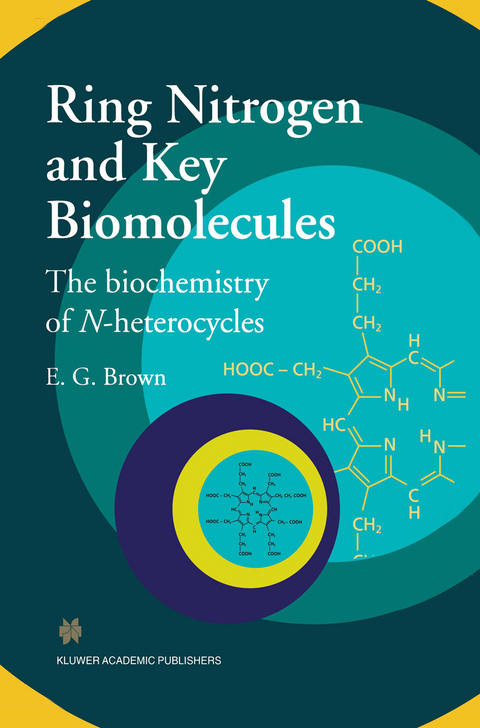
Ring Nitrogen and Key Biomolecules
Chapman and Hall (Verlag)
978-0-412-83570-4 (ISBN)
The nitrogen-containing ring structures are at the hub of metabolism and include ATP, nucleic acids, many coenzymes, metabolic regulators and integrators such as adenosine and GTP, signalling compounds such as cyclic nucleotides and plant cytokinins and biochemically functional pigmets of which haemoglobin, the cytochromes and chlorophyll are examples.
This important book collates and integrates current knowledge of all the biologically important N-heterocyclic compounds, covering the relationship between their chemical structures and physiological functions within this key group of compounds. Few biochemical reaction sequences do not involve one of these compounds as a substrate, product or coenzyme and a full understanding of the interrelationship between their structure and function is vital for all those woorking in the field of biochemistry.
Professor Eric Brown who has a huge wealth of experience in teaching and research on these compounds has written a very comprehensible and thorough book which will be of great value for advanced students and researchers in biochemistry and those at the interfacing subject areas of chemistry, biology and pharmacology including all those employed in researching biological function within pharmaceutical companies.
1. Pyrroles and tetrapyrroles, including porphyrins.- 1.1 Introduction.- 1.2 Natural occurrence of monopyrroles.- 1.3 Pyrrolic properties of biochemical relevance.- 1.4 Discovery and natural occurrence of tetrapyrroles and related compounds.- 1.5 Natural occurrence of dipyrroles and tripyrroles.- 1.6 Porphyrin biosynthesis and interconversion.- 1.7 Porphyrin catabolism and the formation of bile pigments and phycobilins.- 1.8 Biochemical functions.- 1.9 Biological and pharmacological activity.- 1.10 Synthetic compounds of clinical importance.- References.- Wider Reading (books and reviews).- 2. Imidazoles and benzimidazoles.- 2.1 Discovery and natural occurrence.- 2.2 Chemical properties of biochemical interest.- 2.3 Biosynthesis.- 2.4 Catabolism.- 2.5 Biological functions.- 2.6 Biological and pharmacological activity.- References.- Wider Reading.- 3. Pyrazoles.- 3.1 Discovery and natural occurrence.- 3.2 Chemical properties of biochemical interest.- 3.3 Biosynthesis of pyrazole and ?-pyrazol-1-ylalanine.- 3.4 Catabolism.- 3.5 Biological and pharmacological activity.- 3.6 Synthetic pyrazoles of medical and agricultural importance.- References.- 4. Pyridines.- 4.1 Discovery and natural occurrence.- 4.2 Chemical properties of biochemical interest.- 4.3 Biosynthesis and interconversion.- 4.4 Catabolism.- 4.5 Biochemical functions.- 4.6 Biological and pharmacological activity of pyridine derivatives.- 4.7 Synthetic compounds of clinical importance.- 4.8 Compounds of agricultural importance.- References.- Wider Reading (books and reviews).- 5. Pyrimidines.- 5.1 Discovery and occurrence.- 5.2 Chemical properties of biochemical interest.- 5.3 Biosynthesis and interconversion.- 5.4 Pyrimidine catabolism.- 5.5 Biochemical functions of pyrimidines.- 5.6 Biological andpharmacological activity of naturally occurring pyrimidines.- 5.7 Synthetic pyrimidines of pharmaceutical interest.- 5.8 Pyrimidines in horticultural and agricultural use.- 5.9 Pyrimidine chemistry and biochemistry, conclusions.- References.- Wider Reading (books and reviews).- 6. Purines.- 6.1 Discovery and natural occurrence.- 6.2 Chemical properties of biological significance.- 6.3 Biosynthesis and interconversion.- 6.4 Purine catabolism.- 6.5 Defects in purine metabolism.- 6.6 Biochemical functions of purines.- 6.7 Biological and pharmacological activity.- 6.8 Synthetic purines and purine analogues of clinical importance.- 6.9 Conclusions.- References.- Wider Reading (books and reviews).- 7. Pteridines.- 7.1 Discovery and natural occurrence.- 7.2 Chemical and physical properties of biochemical interest.- 7.3 Biosynthesis of folates.- 7.4 Catabolism.- 7.5 Biochemical role of folic acid and its derivatives.- 7.6 Synthetic compounds of clinical importance.- References.- Wider Reading (books and reviews).- 8. Flavins.- 8.1 Discovery and natural occurrence.- 8.2 Chemical properties of biochemical interest.- 8.3 Biogenesis of flavins and pteridines.- 8.3 Biosynthesis of riboflavin.- 8.4 Biochemical role of riboflavin and its derivatives.- 8.5 Synthetic compounds of medicinal or agricultural interest.- References.- Wider Reading (books and reviews).- 9. Indoles.- 9.1 Discovery and natural occurrence.- 9.2 Chemical properties of biochemical interest.- 9.3 Biosynthesis and interconversion.- 9.4 Catabolism.- 9.5 Biochemical functions.- 9.6 Biological and pharmacological activity.- 9.7 Synthetic compounds of clinical importance.- 9.8 Compounds of agricultural and horticultural importance.- Wider Reading (books and reviews).- 10. N-Heterocycles and living systems —conclusions.
| Zusatzinfo | XI, 242 p. |
|---|---|
| Verlagsort | London |
| Sprache | englisch |
| Maße | 155 x 235 mm |
| Themenwelt | Studium ► 1. Studienabschnitt (Vorklinik) ► Biochemie / Molekularbiologie |
| Naturwissenschaften ► Biologie ► Biochemie | |
| ISBN-10 | 0-412-83570-3 / 0412835703 |
| ISBN-13 | 978-0-412-83570-4 / 9780412835704 |
| Zustand | Neuware |
| Informationen gemäß Produktsicherheitsverordnung (GPSR) | |
| Haben Sie eine Frage zum Produkt? |
aus dem Bereich


